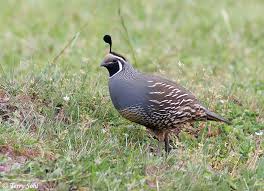记忆方法
1. 它们(鹌鹑)胆子很小.
2. 由于后面有捕食者追赶它们,要吃了它们,鹌鹑们不断的喊快啊、快啊(quail)来相互催促同伴快点儿逃。
3. 谐音“愧哦”。
2. 由于后面有捕食者追赶它们,要吃了它们,鹌鹑们不断的喊快啊、快啊(quail)来相互催促同伴快点儿逃。
3. 谐音“愧哦”。
中文词源
quail 鹌鹑
拟声词,模仿这种鸟叫的声音。
英语词源
- quail
-
quail: Quail the bird [14] and quail ‘cower’ [15] are not related. The former comes via Old French quaille from medieval Latin coacula, which probably originated in imitation of the bird’s grating cry. It is not known for certain where the verb (which originally meant ‘decline, wither, give way’) came from, although some have linked it with another verb quail, now obsolete, which meant ‘curdle’. This came via Old French quailler from Latin coāgulāre, source of English coagulate.
=> coagulate - quail (n.)
- migratory game bird, late 14c. (early 14c. as a surname (Quayle), from Old French quaille (Modern French caille), perhaps via Medieval Latin quaccula (source also of Provençal calha, Italian quaglia, Old Spanish coalla), or directly from a Germanic source (compare Dutch kwakkel, Old High German quahtala "quail," German Wachtel, Old English wihtel), imitative of the bird's cry. Or the English word might be directly from Proto-Germanic. Slang meaning "young attractive woman" first recorded 1859.
- quail (v.)
- c. 1400, "have a morbid craving;" early 15c., "grow feeble or sick;" mid-15c., "to fade, fail, give way," of unknown origin, perhaps from Middle Dutch quelen "to suffer, be ill," from Proto-Germanic *kwaljan, from PIE *gwele- (1) "to throw, to pierce" (see quell). Or from obsolete quail "to curdle" (late 14c.), from Old French coailler, from Latin coagulare (see coagulate). Sense of "lose heart, shrink, cower" is attested from 1550s. According to OED, common 1520-1650, then rare until 19c., when apparently it was revived by Scott. Related: Quailed; quailing.
权威例句
- 1. They dined off salmon, quail, and fruit.
- 他们正餐吃的是鲑鱼、鹌鹑肉和水果。
- 2. I've shot hundreds of quail with that gun.
- 我用那只枪打死过几百只鹌鹑。
- 3. The very words make many of us quail.
- 这些话让我们许多人胆怯了。
- 4. What they did to a sensitive stomach made seasoned sailors quail.
- 这种局面使习惯航海的水兵都感到胃口不舒服.
- 5. The quail were walking around like pullets, seeming all dainty and unseen.
- 雏鸡似的鹌鹑在周围漫步,一副旁若无人的神气, 十分娇美.

